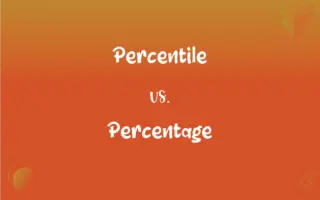Diapause vs. Hibernation: What's the Difference?
Edited by Janet White || By Harlon Moss || Updated on October 28, 2023
Diapause is a dormant state in insects and some animals to survive unfavorable conditions, while hibernation is a deep sleep-like state in animals to conserve energy during winter.

Key Differences
Diapause and hibernation are both survival strategies, but diapause typically occurs in insects and some other animals, allowing them to pause development in response to environmental cues. Hibernation, conversely, is a state of inactivity and metabolic depression found primarily in warm-blooded animals, particularly to survive the winter months.
While diapause can occur at any life stage of an organism, including egg, larval, or adult stages, and can be triggered by changes in daylight or temperature, hibernation is a prolonged sleep-like state that usually happens annually in some mammals. Diapause is a suspension of development, while hibernation is a drastic reduction in metabolic rate.
Diapause can last for extended periods, even years, and is a mechanism for surviving adverse conditions like extreme temperatures or lack of food. Hibernation, however, typically lasts for the winter season, and animals prepare by storing fat to use as energy during their dormant period.
In diapause, the organism's growth and development are temporarily halted, and physiological changes occur to enable survival. In hibernation, animals undergo physiological changes too, but they primarily reduce their body temperature and slow down their metabolism to conserve energy.
Both diapause and hibernation are crucial for the survival of various species, allowing them to bypass periods of environmental stress. However, diapause is more varied in terms of triggers and duration, while hibernation follows a more predictable, seasonal pattern.
ADVERTISEMENT
Comparison Chart
Organisms Affected
Mainly insects, some other animals.
Primarily warm-blooded animals, like mammals.
Purpose
To survive unfavorable conditions.
To conserve energy during winter.
Trigger
Environmental cues like temperature, daylight.
Seasonal changes, usually onset of winter.
State
Developmental arrest or delay.
Deep sleep-like state, reduced metabolism.
Duration
Can vary, from weeks to years.
Typically seasonal, often throughout winter.
ADVERTISEMENT
Diapause and Hibernation Definitions
Diapause
A strategy used by some organisms to delay growth or reproduction.
Diapause ensures the survival of certain species during harsh winters.
Hibernation
A state of inactivity and metabolic depression in animals during winter.
Bears are well-known for their hibernation behavior.
Diapause
A period of suspended development in insects and some animals during adverse conditions.
The butterfly larvae entered diapause until the arrival of spring.
Hibernation
A survival technique involving prolonged sleep-like conditions.
The hedgehog curled up in its den for hibernation.
Diapause
A temporary halt in an organism's life cycle.
Diapause allows eggs to remain viable until conditions improve.
Hibernation
A period of reduced physiological activity to conserve energy.
During hibernation, the bat's heartbeat slows down significantly.
Diapause
A physiological state of dormancy in response to environmental triggers.
Many insects use diapause to survive extreme temperatures.
Hibernation
A seasonal dormancy in warm-blooded animals.
Groundhogs emerge from hibernation in early spring.
Diapause
A mechanism for timing reproduction or development cycles.
Diapause helps synchronize the life cycle with favorable seasons.
Hibernation
A way for animals to cope with food scarcity and cold temperatures.
Hibernation allows some animals to survive without eating for months.
Diapause
A period during which growth or development is suspended and physiological activity is diminished, as in certain insects in response to adverse environmental conditions.
Hibernation
To be in a dormant or torpid state during a cold period, especially during the winter.
Diapause
A temporary pause in the growth and development of an organism due to adverse environmental conditions (especially in insects and in the embryos of many of the oviparous species of fish in the order Cyprinodontiformes)
FAQs
What animals are known for hibernation?
Bears, groundhogs, and some bats are known for hibernation.
Which organisms typically undergo diapause?
Mainly insects and a few other animals.
What is hibernation?
Hibernation is a deep sleep-like state in animals to conserve energy during winter.
What is diapause?
Diapause is a state of suspended development in insects and some animals.
What triggers hibernation?
Typically the onset of winter and colder temperatures.
How long can diapause last?
Diapause can last from weeks to even years.
How do animals prepare for hibernation?
They often eat extra food to build fat reserves.
What happens to body temperature during hibernation?
It significantly decreases to conserve energy.
Are diapause and hibernation reversible?
Yes, both can be reversed when conditions become favorable.
Is hibernation the same in all animals?
No, the specifics can vary between species.
What triggers diapause?
Environmental cues like temperature changes or daylight variations.
Do all insects enter diapause?
Not all; it depends on the species and environment.
Do animals eat during hibernation?
Generally, no. They rely on stored fat for energy.
Do animals lose weight during hibernation?
Yes, they gradually use up their fat reserves.
Is diapause a conscious choice?
No, it's an instinctual response to environmental conditions.
Can diapause occur in adult insects?
Yes, diapause can occur at any life stage, including adulthood.
Is hibernation the same as sleeping?
No, it's a more profound state of inactivity and metabolic slowdown.
Can hibernation occur in warm climates?
Rarely, as it's usually a response to cold temperatures.
Can diapause be artificially induced?
In some cases, yes, for research or conservation purposes.
Does diapause affect reproduction?
Yes, it can delay or pause reproductive processes.
About Author
Written by
Harlon MossHarlon is a seasoned quality moderator and accomplished content writer for Difference Wiki. An alumnus of the prestigious University of California, he earned his degree in Computer Science. Leveraging his academic background, Harlon brings a meticulous and informed perspective to his work, ensuring content accuracy and excellence.
Edited by
Janet WhiteJanet White has been an esteemed writer and blogger for Difference Wiki. Holding a Master's degree in Science and Medical Journalism from the prestigious Boston University, she has consistently demonstrated her expertise and passion for her field. When she's not immersed in her work, Janet relishes her time exercising, delving into a good book, and cherishing moments with friends and family.































































